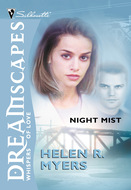Kitap dosya olarak indirilemez ancak uygulamamız üzerinden veya online olarak web sitemizden okunabilir.
Kitabı oku: «Vixen In Velvet», sayfa 2
“You said something about business,” he said.
“I did?” Her heart raced. Was she speaking her thoughts aloud without realizing? Had she suffered a concussion without noticing?
“Before, when you hurried away to my cousin.”
“Oh, that,” she said. “Yes. Where Lord Swanton goes, one usually finds a large supply of young ladies. He’d mentioned to one of our customers his intention of visiting the British Institution this afternoon. It seemed a good opportunity to make the shop’s work known to those unfamiliar with it.”
“Nothing to do with his poetry, then.”
She shrugged, and paid for it with a twinge in her ankle. “I run a shop, my lord,” she said. “I lack the romantic sensibility.” She’d worked since childhood. The young women who worshipped Lord Swanton hadn’t lived in Paris during the chaos, misery, and destruction of the cholera. Grief, suffering, and death weren’t romantic to her.
“It stumps me, I’ll admit,” he said. “I don’t see what’s romantic about it. But then, neither do most men. The ailment seems to strike young women, with a few exceptions. Though she’s at the vulnerable age, Cousin Clara looked bored, I thought. My cousin Gladys looked sour-tempered, but that’s the way she usually looks, so it’s hard to tell whether she’s an idolater or not.”
“Cousin Gladys,” she said. “The young lady with Lady Clara?”
“Lady Gladys Fairfax,” he said. “Lord Boulsworth’s daughter. Clara’s great uncle, you know. The military hero. I’m not sure what’s lured Gladys back to London, though I do have an unnerving suspicion. I say, you’re not well, Miss Noirot.”
They’d reached the bottom of St. James’s Street, and the day’s extreme warmth, already prodigious in Pall Mall, now blasted at them on a hot wind, which carried as well the dust of vehicles, riders, and pedestrians. Leonie’s head ached at least as much as her ankle did. She was trying to remember when last she’d heard Lady Gladys Fairfax mentioned, but pain, heat, and confusion overwhelmed her brain.
“That does it,” he said. “I’m carrying you.”
He simply swooped down and did it, before she got the protest out, and then it was muffled against his neckcloth.
“Yes, everyone will stare,” he said. “Good advertising, don’t you think? Do you know, I do believe I’m getting the hang of this business thing.”
Meanwhile, back at the British Institution
Sir Roger Theaker and Mr. John Meffat, Esquire, were among the few who’d paid attention to Lord Lisburne’s departure with Miss Noirot. The pair had arrived with Lord Swanton’s coterie, but were not exactly part of it, even though they were former schoolmates of the poet.
They were not Lord Swanton’s favorite old schoolmates, having bullied him mercilessly for nearly a year until his cousin got wind of it and thrashed them. Repeatedly. Because they were slow to catch on. They were even slower to forget.
They’d withdrawn some paces from the crowd following Lord Swanton, partly in order to maintain a safe distance from the dangerous cousin.
Theaker’s gaze lingered on the stairwell. Once Lisburne and the ladybird were out of sight he said, “Lisburne’s done for, I see.”
“If anyone’s a goner, it’s the French milliner,” said Meffat. “Ten pounds says so.”
“You haven’t got ten pounds,” said Theaker.
“Neither do you.”
Theaker’s attention reverted to the poet. They watched for a time the young women not-so-surreptitiously pushing to get closer to their idol, while he held forth about the Veronese.
“Annoying little snot, isn’t he?” Theaker said.
“Always was.”
“Writes pure rot.”
“Always did.”
No one could accuse them of not doing all they could to enlighten the reading public. Before Swanton had returned to England, they’d contributed to various journals half a dozen anonymous lampoons of his poetry, as well as two scurrilous limericks. Most of the critics had agreed with them.
But one fashionable young woman had ignored the critics and bought Alcinthus and Other Poems, Swanton’s book of lugubrious verse, and cried her eyes out, apparently. She told all her friends he was the new Lord Byron or some such. The next anybody knew, the printers couldn’t keep up with the demand.
Since watching the little snot wasn’t much fun, Theaker and Meffat turned their attention to the unhappy artist who, having righted his easel, was trying to repair his damaged painting.
They drew nearer to offer jocular advice and accidentally on purpose knock over items he’d carefully restored to their proper places. They suggested their own favorite subjects and argued about whether a corner of the painting more closely resembled a bonnet or a woman’s privates. Being preoccupied with tormenting somebody too weak, poor, or intimidated to fight back—their usual modus operandi—they never noticed the woman approach until she’d cornered them.
And when she said, “I must have your help,” they didn’t laugh, as was also more usual when a person of no importance sought their aid or protection. They didn’t even make lewd suggestions, which was odd, considering she was extremely pretty—fair and slender and young. John Meffat looked at her once, then twice, then seemed very puzzled indeed. He turned an inquiring look upon his friend, who frowned briefly, seeming to be struck by something.
Theaker shot him a warning look, and Meffat held his tongue.
Then Theaker broke out in a kindly smile—it must have hurt his face a little—and said, “Why certainly, my dear. Let’s find us a place a bit less public, and you can tell us all about it.”
Chapter Two
Although the Toilet should never be suffered to engross so much of the attention as to interfere with the higher duties of life, yet, as a young lady’s dress, however simple, is considered a criterion of her taste, it is, certainly, worthy of her attention.
—The Young Lady’s Book, 1829
Lord Lisburne carried Leonie up St. James’s Street in the sweltering heat, past a stream of gaping faces. A couple of vehicles got their wheels tangled, and a gentleman crossing the street walked into a curb post.
Sophy would have seen this as a golden opportunity, Leonie reminded herself. She ignored the headache and throbbing ankle and made her face serene, as though this were an everyday occurrence, being carried to the shop. By a Roman god. Who didn’t even breathe hard.
Darting a glance upward, she discerned a hint of a smile on his perfectly sculpted mouth.
“This is fun,” he said. “Which number did you say? Right, fifty-six. Oh, look. Charming. So French. Does that boy in the breathtaking lilac and gold livery belong to you?”
“Yes,” Leonie said without looking. “That’s Fenwick, our general factotum.”
“Does he open the door or simply stand there looking excessively decorative?”
“One of his jobs is to open the door,” she said.
A stray Sophy had picked up on one of her excursions, Fenwick had been an apprentice pickpocket. Once scrubbed of layers of accumulated street grime, his exterior had proved surprisingly angelic-looking. He was a great success with the ladies. He …
That was when Leonie remembered. Sophy had found Fenwick on the day she’d gone to spy on a business rival. To get into Mrs. Downes’s shop, Sophy had disguised herself as Lady Gladys Fairfax. Or what she imagined Lady Gladys looked like, given Lady Clara’s description and Sophy’s lurid powers of invention.
But Leonie hadn’t time to think further about Lady Gladys. Fenwick had opened the door, Lord Lisburne carried Leonie in, and all the shopgirls promptly went to pieces.
There were cries of “Madame!” and little shrieks, and they ran out from behind counters and crowded about her and Lord Lisburne, then cried, “No, no, give her air!” and dashed off the other way, then came back again. They told one another to fetch water and doctors and smelling salts, and argued about it. Meanwhile, no one was paying attention to the customers, who might have walked away with half the shop, including the mannequins, while everybody else was having hysterics.
Luckily, Selina Jeffreys, their forewoman, hurried out into the showroom, sparing Leonie the need to discipline the troops through an aching head. Jeffreys briskly called them to order and directed Lord Lisburne through the door into the back of the shop. Thence Leonie directed him to her office.
He set her down in a chair. He found a footstool and, ignoring her assurance that she was capable of moving her own foot, knelt, and gently lifted the injured limb onto it. The touch of his hands traveled like a magnetic current up her leg and spread everywhere, including parts some women didn’t even expose to themselves.
“I believe a restorative is in order,” he said as he rose.
He looked perfectly cool. She needed an ice bath.
“Have you any objections to brandy?” she said.
“I meant for you,” he said. “You’re looking peakish.”
“I made a cake of myself in front of London’s latest craze in poets,” she said. “I tripped twice in the same room, and everybody will say I was drunk. The second time, I tripped so clumsily that I turned my ankle. The Marquess of Lisburne has been carrying me about St. James’s, to the entertainment of the multitudes and the mental derangement of my employees. I ache at top and bottom, and I’m in a sweat despite not having done anything but let myself be carried. Of course I look peakish. And I’m cross besides, or I should have said thank you before launching into the complaints.”
“No thanks required, I assure you. It was the most fun I’ve had since Swanton and I came back to London.” He pulled off his gloves. “Where do you keep the brandy?”
She told him. He poured out a drink for her and a drink for him. Then he walked about the office as though he owned the place. Nothing odd in that. Aristocrats always owned the place, whether, technically, they did or didn’t, since they owned England.
But then he started touching her things.
Lisburne was fascinated.
Along one wall, ledgers stood perfectly straight and exactly aligned on three gleaming shelves. Likewise polished to within an inch of its life, the desk held, in addition to an inkstand, a tray of pencils, all sharpened to lethal points. On the other walls, French fashion prints and a few Parisian scenes hung precisely straight and equidistant from one another. Whatever else the office contained must be secreted in the firmly closed drawers and cupboards.
He tipped his head to read the spines of the ledgers, then pulled one out to look at the front. He flipped through the pages. Scrupulously ruled columns held concise descriptions of transactions. Alongside them marched, in the same rigorous order, columns of numbers.
“Not a blot anywhere,” he said. “Do you do this? How do you write all these numbers and such and never blot?”
“My lord, that is private financial information.” The faintly accented voice climbed a degree in pitch.
“Your secrets couldn’t be safer,” he said. “It’s all hieroglyphs to me. I could read it for days and come away none the wiser. No, that’s not quite true. I do know what the red ink signifies. My agent has pointed it out often enough. That is to say, he did, until I left such matters to Uttridge, my secretary. He warns me when I’m stumbling into red ink territory.”
“Your secretary manages your funds?” she said, her horror plainly audible. “You don’t look at the books at all?”
What entertaining handwriting she had! So precise and orderly yet purely feminine.
“The trouble with looking into the books is, it throws a fellow’s inadequacies in his face,” he said, adroitly sidestepping the boring truth. “I note very little in the way of red here, Miss Noirot. And do you do all this yourself, without any Uttridges or agents or such? Simply write down every accursed item and what it costs, and what somebody pays and what the total is and somehow make everything come out right at the end?”
“That’s my job,” she said. “The Duchess of Clevedon specializes in designing clothes. Lady Longmore is in charge of keeping Maison Noirot in the public eye. I manage the business.”
“You keep track of the money, you mean.”
“That’s part of it. I hire and dismiss the seamstresses, attend to their various crises and hysterias, pay everybody’s wages, and oversee all purchasing.”
He closed the book and looked at her for a time. It was a great deal to take in. Her extraordinary face, for one thing. The immense blue eyes and soft mouth and uncompromising chin.
The chin went with the columns of neat numbers and no blots.
The dress belonged to some fairyland.
White ruffles and lace cascading to her waist like ocean foam. Below the lace swelled sleeves as plump as bed pillows. From her dainty waist a skirt billowed: white embroidered with what seemed like thousands of tiny blue flowers. It was deliciously, madly feminine and it made a man want to rumple her, just to hear the rustling.
Well, not only for that reason.
What a treat to carry all that up St. James’s Street!
He looked at the face and the dress and thought about the neat numbers in their precisely ruled columns.
He put the ledger back.
She made a little sound.
“Are you all right?” he said. “Your foot is paining you? More brandy?”
“No, no, thank you,” she said. “My lord, I must detain you no longer. You’ve been so kind, so chivalrous.”
“It was my pleasure, I assure you.” He moved on to inspect her desk. “I had expected another dull afternoon of listening to Swanton being emotional.”
He picked up one of the alarmingly sharp pencils and stuck it into the end of his index finger. It made a tiny indentation. Probably not lethal, unless one stabbed ferociously, which he felt certain she was capable of doing. He examined her meticulously sharpened pens. As he put each object back, he was aware of her breathing erratically, in little huffs.
“Are you feeling overwarm, Miss Noirot?” he said. “Shall I open a window? Or will that only let in more of the day’s heat?”
She made a small strangled sound and said, “If you must pry, my lord—and I realize that noblemen must do as they please—can you not at least put my belongings back in the same order in which you found them?”
He stepped back from the desk and folded his hands behind his back. Not because he was abashed but because he was so sorely tempted to disarrange everything, including, most especially, her.
He looked down at the pencil and the pen, then at the ledgers once more. “Er, no. That is, I could try, but it mightn’t turn out as we hope. That’s the reason Uttridge intervenes, you see. I grow bored very quickly, and things go awry.” That wasn’t entirely untrue. Once he’d fully mastered a thing, he grew bored.
“Your dress is immaculate,” she said.
He glanced down at himself. “Odd, isn’t it? Don’t know how I do it. Well, there’s Polcaire, of course, my valet. Couldn’t do it without him.”
He contemplated his waistcoat for a moment. It was one of his favorites, and he was fairly sure he looked well in it. Some perspicacious genie must have whispered in his ear this day.
No, that was Polcaire.
Polcaire: But milord cannot wear the maroon waistcoat to this occasion.
Lisburne: Swanton is the occasion, which means all the girls will look at him. No one cares what I look like.
Polcaire: One never knows whom one will meet, milord.
Which proved that Polcaire was not only a genius among valets, but an oracle, too.
Lisburne looked up from his waistcoat at Miss Noirot.
The palest pink washed over her cheekbones like a little tide, coming and going. It was delicious.
“Shall I risk trying to get it all straight again?” he said. “My work may not be up to your standards—and I have a strong suspicion that you’re going to leap up from the chair, and …” He thought. “Stab me with the penknife?”
He was aware of her forcing herself to be calm. It wasn’t easy to discern. Her face ought to be in a dictionary, under inscrutable. Though she was a redhead, her complexion was strangely parsimonious about blushing. Still, whatever other faults he had, he wasn’t unobservant, especially of women. In her case, he was paying hawklike attention. The way she relaxed her pose wasn’t unconscious at all. He watched her arrange her features and bring her shoulders down.
“The thought crossed my mind,” she said. “But corpses are the very devil to get rid of, especially aristocratic ones. People notice when noblemen disappear.”
The door having been left partly open, he became aware of the approaching footsteps an instant after he saw her posture grow more alert.
Following a quick tap and Miss Noirot’s “Entrez,” one of the young females who’d thronged the showroom entered.
“Oh, madame, I am so sorry to interrupt you,” the girl said, or at least, that was what he made of her excessively mangled French, before she gave up on a bad job and went on in English, “But it’s Lady Clara Fairfax and … another lady.”
“Another lady?”
Miss Noirot’s face lit, and she bounded up from the chair, momentarily forgetting the injured ankle. She winced and swore softly in French, but her eyes sparkled and her face glowed. “Send them up to the consulting room, and bring them refreshments. I’ll be there in a moment.”
The girl went out.
“Up to the consulting room?” he said. “Are you meaning to mount stairs in your condition?”
“Lady Clara has brought Lady Gladys Fairfax,” she said. “Did you not see her?”
“Of course I saw Gladys. One can no more fail to notice her than one could overlook a toppling building or a forty-day flood. I pointed her out to you.”
“I meant her dress,” she said.
“I looked away immediately, but not soon enough. It was a catastrophe, as usual.”
What Gladys lacked in good nature she made up in bad taste.
“It was,” Miss Noirot said, her tell-nothing face radiant with an excitement as incomprehensible as it was breathtaking. “She needs me. I would get up those stairs if I had to crawl.”
Blast.
And this afternoon had been going so well, too.
Leave it to Gladys to barge in like the Ancient Mariner at the wedding feast.
“What nonsense you talk,” Lisburne said. “You can’t crawl up the stairs. You’ll wrinkle your dress.”
He crossed to Miss Noirot and offered his arm before she could attempt to stagger to the door.
“I’d carry you in,” he said, “but if she spots us, it’ll only make Gladys sarcastic. More sarcastic. And she’ll make your afternoon disagreeable enough as it is. Are you sure you want to see her? Couldn’t you send one of those multitudes of girls?”
“Fob her off on an inferior?” She took his arm. “Clearly you have a great deal to learn about business, my lord.”
“And you’ve a great deal to learn about Gladys. But there’s no helping it, I see. Some people have to learn the hard way.”
He got her up to the next floor, but retreated when he saw the open door and heard Gladys’s voice. It had reached the peevish stage already.
He had a nightmarish recollection of the first time he’d seen her, waiting at the house after his father’s funeral. A spotty, surly, sharp-tongued fifteen-year-old girl who oughtn’t to have been let out of the schoolroom. And her father! The famous military hero, who’d tried to bully a grieving widow into betrothing her son to that obnoxious child. Lord Boulsworth had acted as though Father had been one of his officers, struck down in combat, over whose regiment Boulsworth must assume command—as though other people’s wives and sons and daughters existed merely to march to his orders. Lisburne had encountered her a few times since his return to London. Apart from a remarkably clear complexion, he’d seen no signs of Gladys’s improving with maturity. On the contrary, she seemed to have grown more like her father.
“Sorry to play the coward and cut and run,” he said, “but I’ll do you no favors by hanging about. Clara’s well enough, of course. Gladys is another article. Let’s simply say that she and I won’t be exchanging pleasantries. Seeing me will only put her in a worse humor, if you can imagine that, and I’d rather not make your job any more difficult.”
Forty-five minutes later
Are you blind?” Lady Gladys said. “Only look at me! I can’t have my breasts spilling out of my dress. People will think I’m desperate for attention.”
She glared at the three women studying her, her color deepening to a red unfortunately like a drunkard’s nose.
She sounded furious, but Leonie discerned the misery in her eyes. Her ladyship was difficult: imperious, rude, impatient, uncooperative, and quick to imagine insult. Normal client behavior, in other words.
At present, Lady Gladys stood before the dressing glass, stripped to corset and chemise, thanks to Jeffreys’s able assistance and Lady Clara’s moral support. Even so, reaching this point had been a battle. Meanwhile, Leonie’s ankle hurt, and so did her head, and neither of these things mattered, any more than Lady Gladys’s obnoxious behavior did.
This was the opportunity of a lifetime.
“My lady, one of the basic principles of dress is to emphasize one’s assets,” Leonie said. “Where men are concerned, your bosom is your greatest asset.”
“Greatest I can’t quarrel with, if you mean immense,” Lady Gladys said. “I know I’m not the sylph here.” She shot an angry glance at Lady Clara, who was too statuesque to qualify as a sylph. She did qualify as impossibly beautiful, though: blonde and blue-eyed, gifted with a pearly complexion and a shapely body. And brains. And a beautiful nature.
Nature had not gifted Lady Gladys with any form of classical beauty. Dull brown hair. Eyes an equally unmemorable brown, and like her mouth too small for her round face. A figure by no means ideal. She had little in the way of a waist. But she had a fine bosom, and acceptable hips, though at the moment, this wasn’t obvious to any but the most expert observer.
“That doesn’t mean you don’t have a shape,” Leonie said.
“Do you hear her, Gladys?” Lady Clara said. “Did I not tell you that you were hiding your good parts?”
“I don’t have good parts!” Lady Gladys said. “Don’t patronize me, Clara. I can see perfectly well what’s in the mirror.”
“I beg to differ,” Leonie said. “If you could see perfectly well, you’d see that your corset is wrong for your ladyship’s figure.”
“What figure?” Lady Gladys said.
“Well, let’s see what happens when we take off the corset.”
“No! I’m quite undressed enough. My dressmaker at home—”
“Seems to have a problem with drink,” Leonie said. “I cannot imagine any sober modiste stuffing her client into this—this sausage arrangement.”
“Sausage?” Lady Gladys shrieked. “Clara, I’ve had quite enough of this creature’s insolence.”
“Jeffreys, kindly assist Lady Gladys with her corset,” Leonie said firmly. The modiste who let the client take charge might as well close up shop and earn her living by taking in mending.
“You will not, girl,” Lady Gladys snapped. “You most certainly will not. I refuse to be manhandled by a consumptive child who speaks the most disgusting excuse for French to assault my ears in a city grossly oversupplied with ignoramuses.”
Jeffreys had grown up in a harsh world. This was motherly affection compared to her childhood experience. Undaunted, she moved to the customer, but when she tried to touch the corset strings, Lady Gladys twisted about and waved her arms, practically snarling.
Like a cornered animal.
“Come, come, your ladyship is not afraid of my forewoman,” Leonie said.
“Jeffreys can’t possibly be consumptive,” Lady Clara said. “If she were, she’d be dead, after the ordeal of wrestling you out of your frock and petticoats.”
“I told you this would be a waste of time!”
“And I told you I was tired of a certain person’s sly remarks about remembering your dresses from your first Season. And you said—”
“I don’t care what anybody says!”
“Ça suffit,” Leonie said. “Everybody go away. Lady Gladys and I need to talk privately.”
“I have nothing to say to you,” Lady Gladys said. “You are the most encroaching—no, Clara, you are not to go!”
But Lady Clara went out, and Jeffreys followed her, and gently closed the door behind them.
Lady Gladys couldn’t run after them in her underclothes. She couldn’t dress herself, because, like most ladies, she had no idea how. She was trapped.
Leonie drew out from a cupboard an excessively French dressing gown. The color of cream and richly embroidered with pink buds and pale green vines and leaves, it was not made of muslin, as ladies’ night-dresses usually were. This was silk. A very fine, nearly transparent silk.
She held it up. Lady Gladys sniffed and scowled, but she didn’t turn away. Her gaze settled on the risqué piece of silk, and her expression became hunted.
“You can’t mean that for me,” she said. “That is suitable for a harlot.”
Leonie advanced and draped it over her ladyship’s stiff shoulders.
She turned her to face the looking glass. Lady Gladys’s mutinous expression softened. She blinked hard. “I-I could never wear such a thing, and you’re wicked to suggest it.”
Leonie heard the longing in her voice, and her hard little dressmaker’s heart ached.
Lady Gladys wasn’t a beauty. She’d never been and never would be, no matter how much of the dressmaker’s art one applied.
Yet she could be more.
“I’m not suggesting you purchase it,” Leonie said. “Not yet. It will be more suitable for your trousseau.”
“Trousseau! What a joke!”
“Here’s what we’re going to do,” Leonie said. “We’re going to rid you of that monstrosity of a corset.”
“You are the most managing, impudent—”
“I’ll provide you with something more suitable until I can make up exactly what you need.” Corsets were Leonie’s specialty.
“I will not … You will not …” Lady Gladys blinked hard and swallowed.
“Your ladyship is never to wear ready-made stays again,” Leonie went on briskly. It never did to become emotional with clients. They could manage that sort of thing more than adequately themselves. “They don’t provide proper support and they make you shapeless.”
“I am shapeless. Or rather, I have a fine shape if you like b-barrels.”
“You do have a figure,” Leonie said. “It isn’t classical, but that isn’t important to men. They’re not as discriminating as young women think. You’re generously endowed in the bosom, and once we get that ghastly thing off, you’ll see that your hips and bottom are in neat proportion.”
Lady Gladys looked into the mirror. Her face crumpled. She walked away and sank onto a chair.
“Let us review your assets,” Leonie said.
“Assets!” Lady Gladys’s voice was choked.
“In addition to what I’ve enumerated, you own a clear complexion, an elegant nose, and pretty hands,” Leonie said.
Lady Gladys looked down, surprised, at her hands.
“Of course, the décolletage is of primary importance,” Leonie said. “Men like to look at bosoms. In fact, that’s where they usually look first.”
Gladys was still staring at her hands, as though she’d never seen them before. “They don’t look,” she said. “They never look at me. Then I say things, and—” She broke off. A tear rolled down her nose.
Leonie gave her a handkerchief.
“Your first Season didn’t go well,” Leonie said. She remembered Lady Clara mentioning it—or was that Sophy? In any case, she didn’t know the details. She didn’t need to.
Gladys blew her nose. “There’s a fine understatement! You know. All the world knows. I was a colossal failure. It was so ghastly that I slunk home to Lancashire and never came back.”
“Yet here you are,” Leonie said.
Lady Gladys colored, more prettily this time. “It’s nothing to do with the Season,” she said hurriedly. “It’s nearly over, in any event. But I’d read in the papers that Lord Swanton would be giving a series of readings from his work and some lectures on poetry. It’s—it’s purely literary. The reason I’ve come. Nothing to do with—that is, I won’t run that gantlet again. The balls and routs and such.”
“A young lady’s first Season is like a prizefight or a horse race, I always thought,” Leonie said. “A great lot of girls thrust into Society all at once, and it’s all about getting a husband, and they don’t fight fair. Your rivals might not take a whip or spurs to you as you run alongside, but they use words in the same way.”
Lady Gladys laughed. “Rivals! I don’t rival anybody. And there I was, making my debut with Clara, of all people. Aphrodite might have stood a chance. Or maybe not.”
“I understand the difficulty,” Leonie said. “Still, let’s bear in mind that you made your debut before my sisters and I became established in London. You were not properly prepared.” Among other things, Lady Gladys’s governesses and dancing masters had served her as ill as her dressmaker had done. Her ladyship didn’t walk; she lumbered. And her walk was only one unfortunate trait. “Certainly you weren’t properly dressed.”
“Oh, yes, that explains everything. If you’d had the managing of things, I’d have been the belle of the ball.”
Leonie stepped back a pace, folded her arms, and eyed her new client critically. After a long, busy moment while her mind performed complicated calculations, she said, “Yes, my lady. Yes, you would have been. And yes, you can be.”
Early evening of Friday 10 July
You hateful little sneak! I always attend her!”
“Always? Once, two months ago.”
“It was only last week I waited on Miss Renfrew, while you was flirting with Mr. Burns.”
“I never was!”
“Maybe he wasn’t flirting with you, but you was trying hard enough.”
Leonie had heard the raised voices, and was hurrying from her office into the workroom at the same time as Jeffreys, on the same errand, was running that way from the showroom.
Ücretsiz ön izlemeyi tamamladınız.








